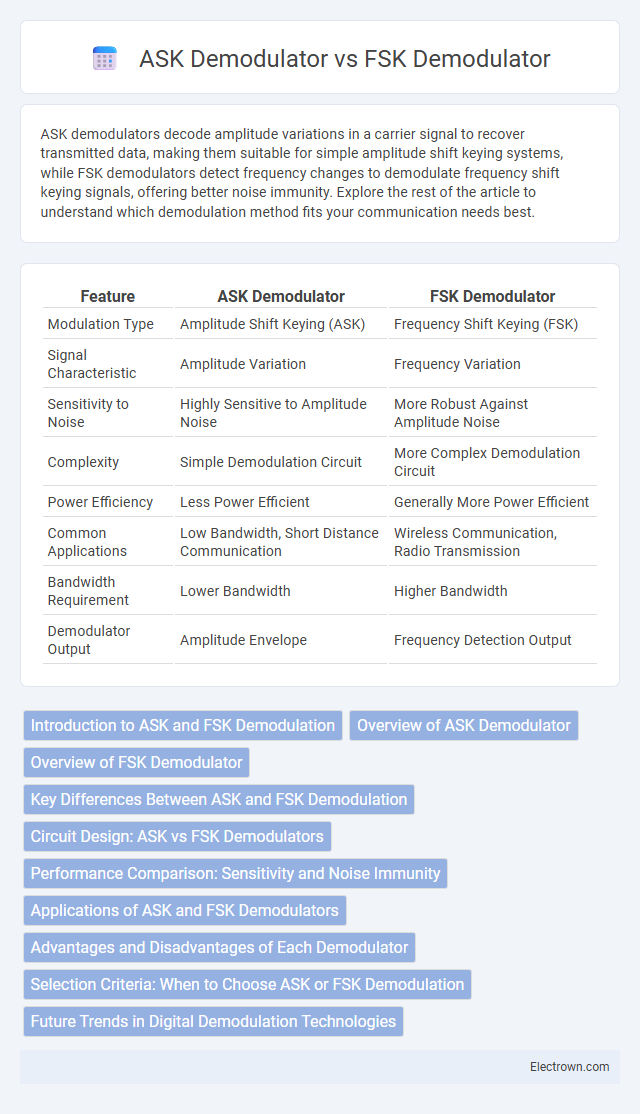ASK demodulators decode amplitude variations in a carrier signal to recover transmitted data, making them suitable for simple amplitude shift keying systems, while FSK demodulators detect frequency changes to demodulate frequency shift keying signals, offering better noise immunity. Explore the rest of the article to understand which demodulation method fits your communication needs best.
Table of Comparison
| Feature | ASK Demodulator | FSK Demodulator |
|---|---|---|
| Modulation Type | Amplitude Shift Keying (ASK) | Frequency Shift Keying (FSK) |
| Signal Characteristic | Amplitude Variation | Frequency Variation |
| Sensitivity to Noise | Highly Sensitive to Amplitude Noise | More Robust Against Amplitude Noise |
| Complexity | Simple Demodulation Circuit | More Complex Demodulation Circuit |
| Power Efficiency | Less Power Efficient | Generally More Power Efficient |
| Common Applications | Low Bandwidth, Short Distance Communication | Wireless Communication, Radio Transmission |
| Bandwidth Requirement | Lower Bandwidth | Higher Bandwidth |
| Demodulator Output | Amplitude Envelope | Frequency Detection Output |
Introduction to ASK and FSK Demodulation
ASK demodulators detect variations in signal amplitude to recover transmitted information, making them suitable for simpler, amplitude-modulated signals. FSK demodulators differentiate frequency shifts to decode data, offering robustness against noise in frequency-modulated signals. Your choice depends on communication requirements, with ASK favoring amplitude variation detection and FSK excelling in frequency-based signal interpretation.
Overview of ASK Demodulator
An ASK demodulator extracts digital data by detecting amplitude variations in the received signal, making it well-suited for systems using amplitude shift keying modulation. By analyzing changes in signal amplitude, the demodulator converts the modulated waveform back into original binary data with minimal distortion. Your choice of an ASK demodulator can enhance performance in environments where amplitude changes are more reliable than frequency variations.
Overview of FSK Demodulator
FSK Demodulators decode frequency-shift keying signals by detecting variations in frequency to distinguish between binary data, making them ideal for noisy environments. These demodulators outperform ASK Demodulators, which rely on amplitude changes and are more susceptible to signal degradation. Your choice of FSK Demodulator enhances communication reliability and data integrity in digital transmission systems.
Key Differences Between ASK and FSK Demodulation
ASK demodulation detects changes in amplitude to recover digital data, while FSK demodulation identifies frequency shifts to decode the transmitted signal. ASK demodulators are simpler and more susceptible to noise, whereas FSK demodulators provide better noise immunity and are often used in wireless communication. Your choice depends on the required signal robustness and application environment.
Circuit Design: ASK vs FSK Demodulators
ASK demodulator circuits typically rely on envelope detectors or coherent detection methods that extract amplitude variations from the carrier signal, featuring simpler designs ideal for low-complexity applications. FSK demodulators involve frequency discrimination techniques, such as phase-locked loops (PLLs) or frequency counters, to identify distinct frequency tones, resulting in more complex circuitry optimized for noise resilience and frequency accuracy. Your choice between ASK and FSK demodulator circuit design depends on the application's requirements for complexity, noise immunity, and data transmission reliability.
Performance Comparison: Sensitivity and Noise Immunity
ASK demodulators typically exhibit lower sensitivity due to their amplitude-based signal detection, making them more susceptible to noise and amplitude fluctuations in the communication channel. FSK demodulators use frequency variations for data representation, offering improved noise immunity and better performance in environments with amplitude fading and interference. Understanding these differences helps you select the appropriate demodulation method for enhanced signal reliability and communication quality.
Applications of ASK and FSK Demodulators
ASK demodulators are widely used in optical communication systems and low-cost, short-distance wireless devices due to their simple implementation and efficient data transmission in clear channel conditions. FSK demodulators find applications in radio frequency identification (RFID), telemetry, and two-way radio communication, where robustness to noise and signal distortion is critical. Both demodulator types play essential roles in digital communication systems, with ASK favored for high-speed data links and FSK preferred for reliable performance in noisy environments.
Advantages and Disadvantages of Each Demodulator
ASK demodulators offer simple implementation and cost-efficiency, making them ideal for low-complexity systems, but they are highly susceptible to noise and signal degradation. FSK demodulators provide better noise immunity and more reliable communication in noisy environments, though they often require more complex circuitry and higher power consumption. Your choice depends on balancing system requirements for robustness versus simplicity and cost.
Selection Criteria: When to Choose ASK or FSK Demodulation
ASK demodulators are ideal for systems requiring simple implementation and low bandwidth, especially in low-noise environments or short-range communication where power efficiency is critical. FSK demodulators are preferred in noisy channels or long-distance communications due to their robustness against amplitude fluctuations and better noise immunity. Selection between ASK and FSK demodulation depends on factors like channel conditions, data rate requirements, power constraints, and the complexity of the receiver design.
Future Trends in Digital Demodulation Technologies
ASK demodulators, leveraging amplitude variations for symbol detection, face challenges in noise susceptibility leading to research on advanced error correction and adaptive filtering techniques. FSK demodulators, which rely on frequency shifts, benefit from increased robustness in fading environments and are evolving with machine learning algorithms to enhance signal classification and interference mitigation. Future digital demodulation technologies emphasize hybrid schemes integrating ASK and FSK principles with AI-driven signal processing to improve data rates, reliability, and energy efficiency in IoT and 5G communication systems.
ASK Demodulator vs FSK Demodulator Infographic

 electrown.com
electrown.com